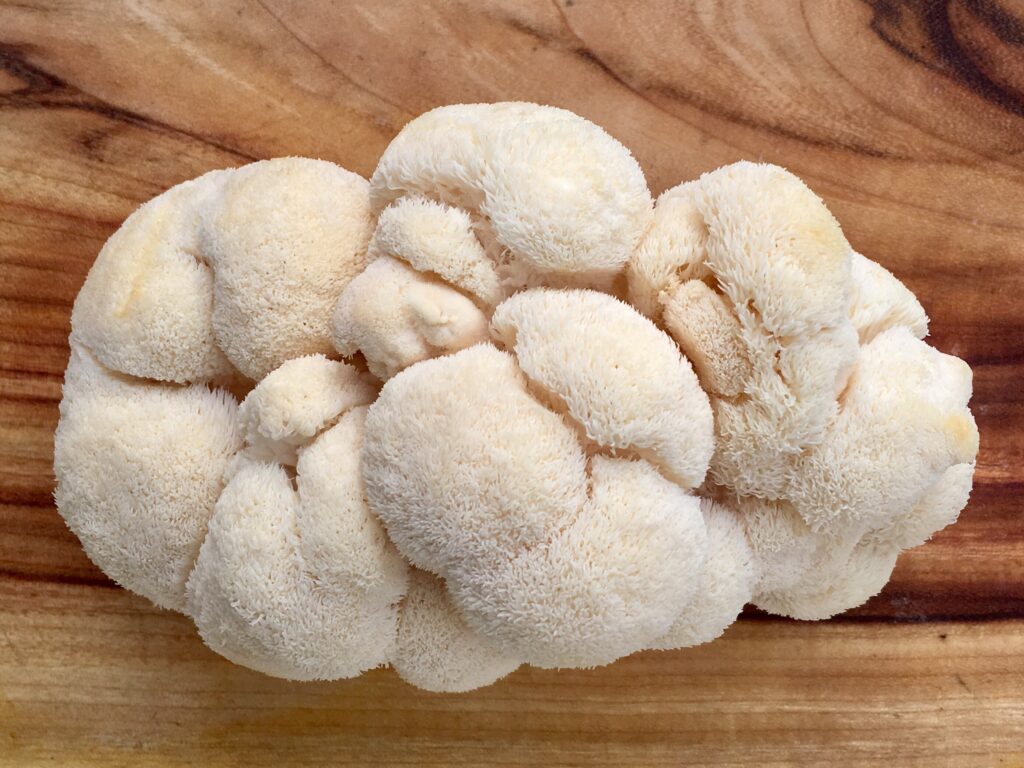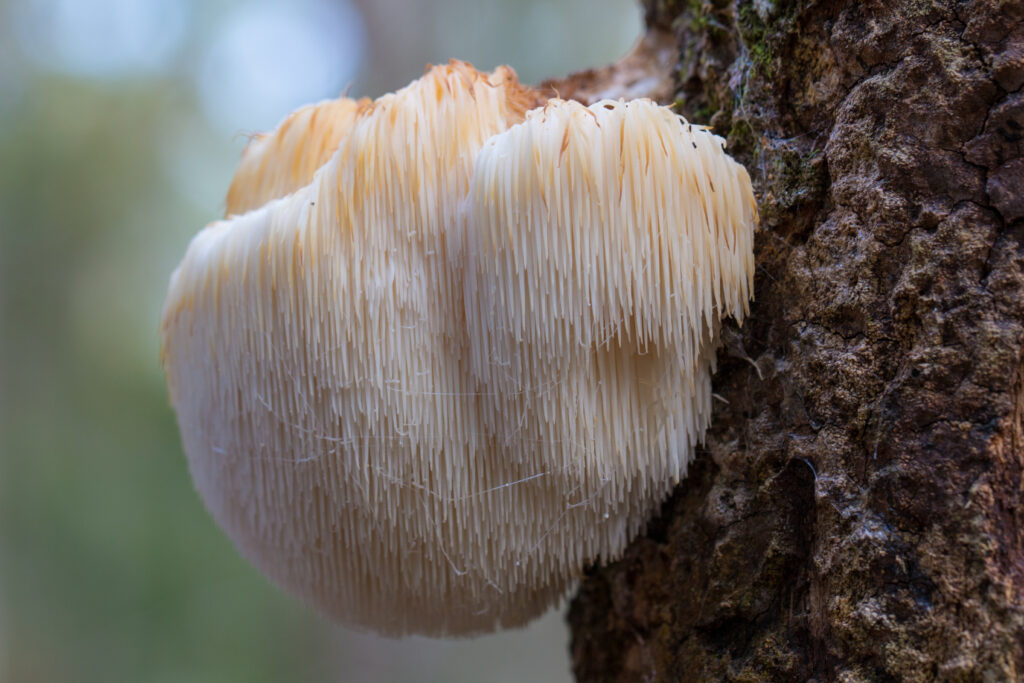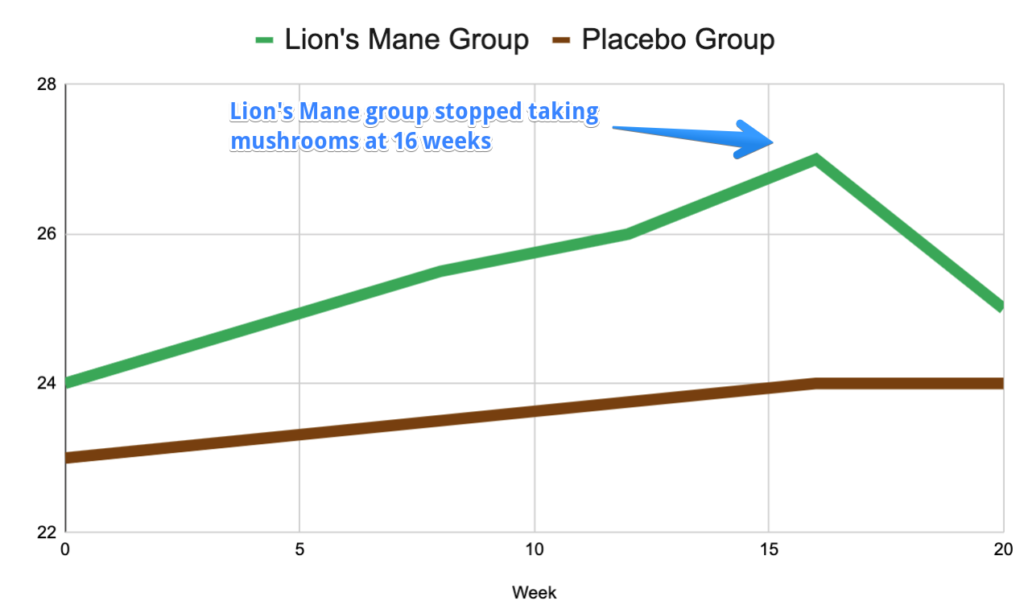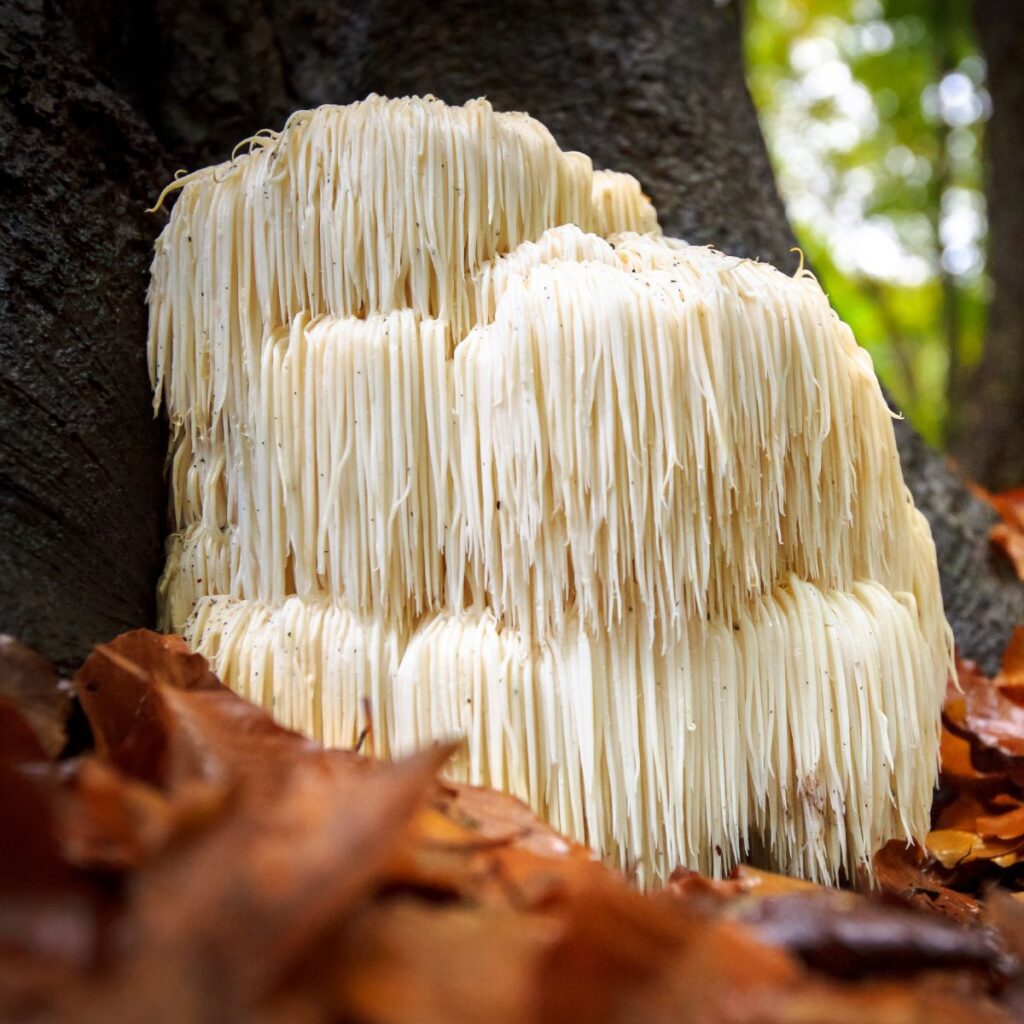
A quick story about Dementia…
UPDATE: please see our Lion’s Mane powder buying guide here.
I remember two things about my great grandma Martha. I remember her sitting in a chair at our lake cottage, and and I remember going to visit her at a nursing home with my brother and aunt. My great-grandma ate mushed up banana and didn’t have a clue who my brother or I were, or even who my aunt was.
My 3 year old brain struggled grabbing on to why she seemed so confused. I remember thinking, “why is she asking who we are?” and, “why does she keep looking around like she’s lost?” The crushing sadness that no doubt haunted my aunt and mother skipped right by me. What pre-kindergartner would understand that? Dementia and Alzheimers rob us of one of the best things that life brings – cherished time connecting with loved ones. Did you know that Alzheimer’s disease caused over 120,000 deaths in the US in 2017? It ranked as the 5th-leading cause of death in 2017 according to a government study.
Is anything sweeter than sharing warm, lucid moments with those you love? Does anything fill you up as much as looking into the eyes of a loved one and feeling warmth spread through you as they return your gaze? Seeing a person you knew fade away into confusion and a fog can break the strongest hearts among us.
What if you help a loved one lift that fog of confusion, even a little? What if you found something to improve their cognitive impairment? What if you could help that person by giving them something scientifically proven to be safe, effective, and affordable?
Would you do it?
How much is an extra day with that person worth? One dollar? Ten? A hundred? A thousand?
Let me tell you about a study that may offer some help.
This Japanese Study Proved Taking Lion’s Mane Mushroom Powder Improved Mild Cognitive Impairment (Dementia) By 14%.
In 2008 a team of Japanese scientists studied the impact of taking Lion’s Mane Mushroom powder on “Mild Cognitive Impairment”. ‘Mild Cognitive Impairment” is another term for the early stages of Dementia and Alzheimers.

The conclusion of the study states:
“Yamabushitake (Lion’s Mane Mushrooms) can be regarded as a useful food for the prevention of dementia without any adverse effects.”
We describe the study and results in detail below, but check out this quick summary first. The results may shock you. They certainly shocked me.
The scientists split the study participants into two groups, one that took the mushroom powder and one that got a placebo. A placebo is a substance proven to have zero impact, in this case corn starch.
The scientists gave the subjects either the mushroom powder or placebo every day for 16 weeks. They measured their cognitive ability on a “cognitive function scale” of 0-30 during the 16 weeks, and at 4 weeks after that 16 week period.
The test measured cognitive impairment. A score of 30 rated as the best (the least cognitive impairment), and 0 counting as the worst (the most cognitive impairment).
So Did Lion’s Mane Mushroom Improve Dementia?
The group that took the mushroom powder scored significantly higher, meaning they showed less cognitive impairment. Two subjects that took the mushrooms hit the max score of 30 by week 16. Nobody that took the placebo placebo group scored over 26. Over half of the group taking the mushrooms scored at 26 or higher.

The group that took the mushrooms improved their average score from 23.9 to 27.4, a 14% improvement. How much is 14% ? Think about it this way – 14% of a week equals one whole day per week. Imagine if a loved one with dementia regained lucidity for one more whole day per week? How amazing would that be?
That’s likely not how the impact plays out, but 1 day out of 7 is a good way to visualize a 14% improvement.
The group that took the placebo improved their average score from 23.2 to 24.0, an improvement of 3%. Why did the placebo group improve? It could be random variation, or perhaps the group got better at the test by taking it a few times.
Let’s take a closer look at the study to understand what the researchers did. We’ll dive into exactly how they ran the studay and why the results could provide better days for people suffering dementia.
A Detailed Look At The 2008 Japanese Study On The Affect of Mushrooms On Alzheimers And Dementia
To find the actual study, look up it’s formal name, “Improving Effects of the Mushroom Yamabushitake (Hericium erinaceus) on Mild Cognitive Impairment: A Double-blind Placebo-controlled Clinical Trial”, or click the link here.
How Did The Japanese Scientists Run The Study?
A group of Japanese scientists performed the study in 2008. Like most scientific studies, they used a double-blind, parallel-group, placebo-controlled trial. What do these terms mean in normal human terms?
Let me explain each.
Double Blind
The double-blind method means that the researchers divided the study subjects into two groups. They gave one group the lion’s mane mushroom, and the other group a substance proven not to give any impact. The first part of the “double blind” means that the researchers did not know which group got the lion’s mane mushroom. The second part of the “double blind” means the subjects did not know if they took the lion’s mane mushroom or the placeholder substance. This “double blind” method ensures the best accuracy when measuring the impact of the lion’s mane mushroom.
Placebo Controlled
A placebo represents something that has no impact on the result tested in the study. For example, in this case giving test subjects water or bread would count as a placebo, as neither carry any impact on cognitive function. In this study the scientists used a combination of cornstarch and lactose for the placebo. One half of the study participants received the corn starch and lactose, the other half took the mushroom powder. They researchers did this to make sure any impact came from the mushrooms and not other factors.
Parallel Group
Parallel group studies run with both groups completing the study at the same time. The group taking the mushroom powder completed the study during at the same time as the group taking the placebo. The scientists ran the study this way to remove any variables that different timeframes could have introduced.
How Long Did The Study Last?
The study lasted 22 weeks, broken down into three phases:
- Phase 1: First 2 weeks – the researchers performed preliminary examination of the study participants
- Phase 2: Next 16 weeks – the study participants took either the placebo or lion’s mane mushroom powder
- Phase 3: Last 4 weeks – the researchers performed follow-up observations
Who Took Part In The Study?
The researchers chose thirty 50-80 year old Japanese men and women diagnosed with mild cognitive impairment (dementia). Each of the study group qualified for the following criteria:
- They scored a 22 to 25 out of 30 points on a cognitive function scale based on the Revised Hasegawa Dementia Scale in a preliminary examination. Keep reading for a full explanation of the Revised Hasegawa Dementia Scale.
- They led clinically healthy lives with no other disorder seen as a problem in the examination
The researchers randomly split the 30 people into 2 groups of 15 people each. The researchers made sure the two groups matched in the following areas:
- the subjects scored similarly to each other the cognitive function test at the beginning of the study
- the subjects’ ages matched closely between the two groups
The researchers conducted the study with the approval of the Institutional Review Board at Isogo Central and Neurosurgical Hospital, and with the written consent of the subjects in accordance with the Declaration of Helsinki.
How Much Lion’s Mane Mushrooms Did The Study Participants Take?
The study participants that took the mushrooms took four 250 mg tablets of Yamabushitake (Lion’s Mane Mushroom) dry powder three times a day for 16 weeks.
In total they took 3000 mg/day of lion’s mane mushroom powder.
4 tablets x 250 mg x 3 times per day = 3000 mg per day
The researchers prepared the lion’s mane mushroom powder as follows:
- They used the fresh fruit bodies (not the mycelium) of Lion’s Mane Mushrooms (Yamabusitake). They air-dried them at 140 degrees farenheit (60 °C) overnight and then powdered the mushrooms. The combined the mushroom powder with silicon dioxide and fat to create 250mg tablets.
- The resulting 250 mg tablets consisted of:
- 96% of lion’s mane
- 1.6% silicon dioxide
- 2.4% fat
- The fresh fruit bodies of mushrooms typically carry much more impact than the mycelium, which is why the researchers only used the fruiting bodies.
- Silicon dioxide, more commonly known as silica, is a naturally occurring substance used as an anti-caking agent.
The study participants that took the placebo took four 250 mg tablets of cornstarch and lactose three times a day for 16 weeks. The placebo tablets consisted of:
- 70% lactose
- 20% cornstarch
- 2% caramel
- 4% silicon dioxide
- 4% fat

How Did The Researchers Make Sure Other Drugs or Supplements Did Not Interfere?
To ensure the results only measured the impact of taking lion’s mane powder, the researchers did not allow anyone to participate if they took the following drugs:
- Donepezil hydrochloride – this is the only drug that has received approval for use in Alzheimer’s disease patients in Japan
- Any drug showing possibilities of improvement of cognitive impairment by an increase of cerebral blood flow. These include ifenprodil tartrate, sermion, meclofenoxate, ibudilast, amantadine hydrochloride, tiapride hydrochloride, and calcium hopantenate.
The researchers did not allow the intake of any foods reported to affect cognitive impairment. These include ginkgo leaf extract or foods containing a significant amount of DHA.
The study subjects recorded the intake of all foods they at, any subjective symptoms they encountered and any changes in lifestyle. They recorded this information in study diaries throughout the trial period. The researchers evaluated these diaries to spot anything that could skew the study results.
How Did The Researchers Measure Results?
The researchers measured cognitive function at the beginning of the trial, at 8 weeks, 12 weeks, and 16 weeks.
They used the Revised Hasegawa Dementia Scale (HDS-R for short). The HDS-R reportedly delivers more accurate results than the Mini-Mental State Examination (MMSE for short) as a screening instrument for Alzheimer’s disease. For more detail, please refer this this study (Kim et al., 2005).
Researchers use the MMSE more widely for screening cognitive impairment. However, scientists developed the MMSE to evaluate elderly psychiatric patients rather than cognitive impairment patients. Because of this critics point out shortcomings in the MMSE for its level of sensitivity and specificity for cognitive impairment (dementia) patients. This is why the researchers in this study chose the HDS-R, as it better measures cognitive impairment in a normal population of adults.
The HDS-R test consists mainly of a verbal test. The researchers in this study added a drawing test to evaluate visuospatial and constructional functions of the study participants. The drawing test required the subjects to draw the numbers of a clock on a pre-drawn 3 centimeter circle. The researchers awarded a score of 2 points if the participant drew all 12 numbers in the correct position.
The researchers reduced the HDS-R to a total score of 28 points from 30 points, and added 2 points for the drawing test, making total score of 30 points.
What Did The Results of The Study Show?
The study results show that Lion’s Mane can improve mild cognitive impairment (Dementia & Alzheimers). The study group that took Lion’s Mane showed significantly increased scores on the cognitive function scale compared with the placebo group.
Did The Improvements In Cognitive Function Last Without Taking Lion’s Mane Powder?
Phase 3 of the test measured the impact on both groups of not taking either the lion’s mane mushroom powder or the placebo for 4 weeks. This 4-week period came immediately after after the 16-week period where both study groups took either the placebo or the lion’s mane mushroom powder.
When the researchers tested the lion’s mane group 4 weeks after they stopped taking the lion’s mane powder, the group’s scores decreased significantly.
This finding suggests that people need to keep taking lion’s mane mushroom powder to gain the improvements in cognitive function.
Did Lion’s Mane Mushroom Powder Cause Any Adverse Side Effects?
Researchers conducted a number of laboratory tests after the study to measure any adverse effects of taking Lion’s Mane mushroom powder.
The researchers tested impacts on the items below at weeks 0, 8 and 16 of the trial. They did not record measurements that fell out of the normal range. This means they did not find any adverse impacts to taking Lion’s Mane Mushroom powder.
- Body weight and body mass index (BMI)
- Systolic/diastolic blood pressure
- Pulse rate
- Body temperature
- Blood tests
- White blood cell (WBC)
- Red blood cell (RBC)
- Hemoglobin
- Platelets
- Total protein
- Albumin
- Total bilirubin
- Aspartate aminotransferase (AST)
- Alanine aminotransferase (ALT)
- Alkaline phosphatase (ALP)
- Lactate dehydrogenase (LDH)
- γ-glutamyl transpeptidase (γ-GTP)
- Total cholesterol
- HDL-cholesterol (HDL)
- triglyceride
- LDL-cholesterol (LDL)
- Uric acid
- Blood urea nitrogen (BUN)
- Creatinine
- Glucose
- Sodium (Na)
- Chlorine (Cl)
- Potassium (K)
- Serum iron (Fe))
The test results showed no adverse effects. This is not surprising as humans have eaten lion’s mane mushrooms for thousands of years with scant (if any) reports of harmful effects.
Furthermore, the study states:
…mushrooms are known to be low in calories and rich in fiber, and they are safe for patients with diabetes, hyperlipemia and arteriosclerosis.
How Do Lion’s Mane Mushrooms Improve Dementia and Alzheimers Symptoms?
The brains of Alzheimer and dementia patients show notable abnormalities in their cholinergic neurons. Nerve Growth Factor (NGF) is a protein that acts on cholinergic neurons and promotes their survival. Delivering NGF in medicines proves difficult because the NGF protein cannot cross the blood-brain barrier.
Lion’s Mane mushrooms contain compounds that promote NGF synthesis. Put simply, this means:
- Compounds in Lion’s Mane mushroom promote the production of Nerve Growth Factor (NGF) proteins
- NGF proteins help cholinergic neurons survive and differentiate in the brain
- Increasing healthy cholinergic neurons in the brain increases cognitive function and reduces the symptoms of Alzheimers and dementia
The study results prove that Lion’s Mane mushroom is useful for treating and preventing dementia.
Why is Finding a Dementia Treatment Important (And A Story About My Wedding)?
Senile dementia is a serious social problem. In particular, Alzheimer’s disease remains without effective therapeutic measures.
On a personal level, dementia struck my family on one of the most important days of my life – my wedding day. My mom’s uncle came to our wedding and decided to give an impromptu speech.
I looked up to him like a grandfather, as we lived close to him, we celebrated holidays with him, and saw him often. He lived a great life, immigrating from Germany as a baby, raising a great family, and leading a very active life full of sailing, biking, and exercising. I remember laughing at his dry humor as a kid and watching in awe as he fixed boat motors and other mechanical things.
Dementia struck him in his later years. At the time he came to our wedding, dementia had crept in a bit, to where family members could notice, but it had not completely taken over yet.
Back to our wedding. I gave a speech after my father-in-law and best man said their words, and everyone dove into their food and table conversations. Everyone thought they successfully made it through the speech gauntlet. A minute or so after, my mom’s uncle got up and proceeded to give a rambling speech where he called me “aloof” (seriously). He finished his speech by advising everyone the key to a happy marriage is for the husband to acknowledge that in any argument, “the wife is always wrong.” He sat down and stood up half a minute later to correct his mistake, he obviously meant to say, “the wife is always right.”
My heart broke for him. I didn’t imagine a family member would give a speech calling me “aloof” at my wedding, but I didn’t care about that. My heart broke because I saw first-hand how dementia robbed a once-vibrant person of what made him so vibrant – his mind. A confused, muddled person replaced the man I knew before. My heart broke not only for him, but for his wife, for my mom, and all the other people close to him.
Statistics show us the size of the problem. That pales in comparison to the years of personal connection that dementia and Alzheimers steal from us.
This study gives hope that Lion’s Mane Mushrooms can give people and families precious more time. More time connecting with loved ones, more time enjoying life, and more time enjoying life instead of living scared and confused.
How You Can Use Lion’s Mane to Help Dementia?
Luckily you can get Lion’s Mane mushrooms in a variety of ways, from a bunch of quality sources.
Lion’s Mane Powder
Many providers sell Lion’s Mane in powder form. You can mix it into food, put in your coffee or tea, or put into smoothies. I enjoy it in my morning coffee. Check out these options below, I’ve tried a few, I note where I have. You can find others on Amazon and by searching the internet as well:
- Terrasoul Superfoods Organic Lion’s Mane Mushroom Powder (4:1 Extract)
- This is my favorite so far. I like that it’s organic, and the powder comes from the fruiting bodies, not the mycelium.
- Electric – Lion’s Mane Mushroom Extract Powder – USDA Organic
- I liked this one too. It included a helpful scoop in the package.
- Lions Mane Mushroom Extract Powder by Real Mushrooms – Certified Organic
- I am going to try these guys next. They have a great mushroom questions page, and seem like a high-quality operation.
When you shop make sure you look for these key things:
- What part of the mushroom did the powder come from? Look for powder made from the fruiting body of the mushroom (the mushroom) instead of the mycelium (the mushroom’s “root system”)
- Who grew the mushrooms? Where did they grow them? What did they grow them on? Verify where the mushrooms came from, and try to find the original supplier to make sure they use quality growing methods. China supplies 85% of the worlds mushrooms. Make sure you trace the mushroom powder back to the original grower and understand the grower’s quality practices.
- Are the mushrooms organic? Organic mushrooms give you comfort that you’re not ingesting any harmful substances.
Lion’s Mane Tinctures
What is a “tincture”? Think of a tincture as a liquid extract of a mushroom in a very potent form. Producers create tinctures by drying out mushrooms, soaking them in alcohol, and using hot water to extract the essence of the mushrooms. Check out these options to buy tinctures:
- Host Defense, Lion’s Mane Extract: Host Defense is Paul Stamets & Fungi Perfecti’s brand. This is one of the highest trusted brands around.
- North Spore Lion’s Mane Tincture: Reading North Spore’s site shows you their commitment to quality. I love their helpful content and mission.
Lion’s Mane Coffee
Coffee with Lion’s Mane and other mushroom powder burst onto the market in a big way with the company Four Sigmatic. Four Sigmatic produces pre-packed coffee packets that include both the coffee and the mushroom powder mixed in.
- Four Sigmatic Mushroom Coffee with Lion’s Mane & Chaga: Four Sigmatic doesn’t sell a standalone Lion’s Mane mushroom coffee, this one also includes Chaga mushroom powder.
- Four Sigmatic Lion’s Mane Mushroom Elixir – USDA Organic Lions Mane Mushroom Powder: This is just their Lion’s Mane powder, not mixed with coffee. Use these packets to mix with your coffee or tea.
Lion’s Mane Supplements
An easy way to take Lion’s Mane is by taking supplements. Check out a few options below.
- Fungi Perfecti: Paul Stamets runs Fungi Perfecti. Paul ranks as one of the most well known fungi researchers, I highly recommend his podcast with Tim Ferriss and watching the moving Fantastic Fungi, which features him.
- Lion’s Mane Mushroom Cognition Capsules from Real Mushrooms: The capsules from Real Mushrooms.
Grow Your Own Lion’s Mane
For adventurous souls, growing your own Lion’s Mane mushroom offers a great way to get fresh Lion’s Mane mushrooms. Lion’s Mane tastes great when cooked with butter, with many people saying it tastes like lobster. Growing Lion’s Mane is a snap with grow kits, we grew a nice crop of Lion’s Mane on our first try with zero prior experience growing mushrooms. We used a grow kit from Fungi Perfecti, but they don’t sell them anymore. Check out a few options below.
- Mushroom Man LLC, Lion’s Mane Mushroom Kit: I haven’t tried this one, but others rate it highly on Amazon.
- Lion’s Mane Grow Kit from North Spore: A good option from crew at North Spore.
Conclusion
The thought of dementia or Alzheimers robbing me of my brain scares the daylights out of me. Dementia runs strong in my mom’s side of the family. I want to do everything I can to make sure dementia does not me rob me and my family of quality years.
This study Lion’s Mane provides a scientifically-proven, safe, low-cost treatment for dementia and Alzheimer’s. Is it a cure? No. Do the study results show that it can help? Yes. Is it safe? Yes.
If you plan to try Lion’s Mane powder, please read our Lion’s Mane buying guide.

I have been looking for my father information on Lion’s Mane. There is a lot of garbage out there. Thank you so much for pulling your research together for the rest of us. You saved me a ton of time. I will start taking it as well thanks to you.
would like to try it on my mother.